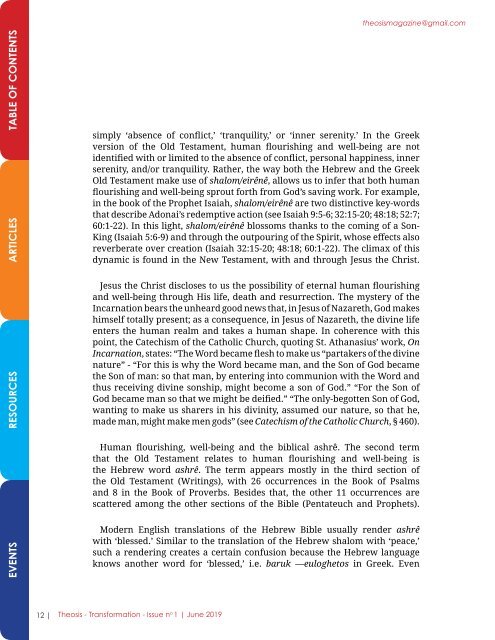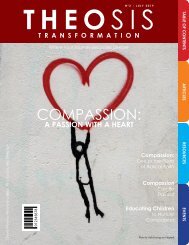Theosis 06 June Issue 2019
Theosis-Transformation is a monthly online magazine focused on Bible, Psychology and Spirituality.
Theosis-Transformation is a monthly online magazine focused on Bible, Psychology and Spirituality.
Create successful ePaper yourself
Turn your PDF publications into a flip-book with our unique Google optimized e-Paper software.
theosismagazine@gmail.com<br />
simply ‘absence of conflict,’ ‘tranquility,’ or ‘inner serenity.’ In the Greek<br />
version of the Old Testament, human flourishing and well-being are not<br />
identified with or limited to the absence of conflict, personal happiness, inner<br />
serenity, and/or tranquility. Rather, the way both the Hebrew and the Greek<br />
Old Testament make use of shalom/eirênê, allows us to infer that both human<br />
flourishing and well-being sprout forth from God’s saving work. For example,<br />
in the book of the Prophet Isaiah, shalom/eirênê are two distinctive key-words<br />
that describe Adonai’s redemptive action (see Isaiah 9:5-6; 32:15-20; 48:18; 52:7;<br />
60:1-22). In this light, shalom/eirênê blossoms thanks to the coming of a Son-<br />
King (Isaiah 5:6-9) and through the outpouring of the Spirit, whose effects also<br />
reverberate over creation (Isaiah 32:15-20; 48:18; 60:1-22). The climax of this<br />
dynamic is found in the New Testament, with and through Jesus the Christ.<br />
Jesus the Christ discloses to us the possibility of eternal human flourishing<br />
and well-being through His life, death and resurrection. The mystery of the<br />
Incarnation bears the unheard good news that, in Jesus of Nazareth, God makes<br />
himself totally present; as a consequence, in Jesus of Nazareth, the divine life<br />
enters the human realm and takes a human shape. In coherence with this<br />
point, the Catechism of the Catholic Church, quoting St. Athanasius’ work, On<br />
Incarnation, states: “The Word became flesh to make us “partakers of the divine<br />
nature” - “For this is why the Word became man, and the Son of God became<br />
the Son of man: so that man, by entering into communion with the Word and<br />
thus receiving divine sonship, might become a son of God.” “For the Son of<br />
God became man so that we might be deified.” “The only-begotten Son of God,<br />
wanting to make us sharers in his divinity, assumed our nature, so that he,<br />
made man, might make men gods” (see Catechism of the Catholic Church, § 460).<br />
Human flourishing, well-being and the biblical ashrê. The second term<br />
that the Old Testament relates to human flourishing and well-being is<br />
the Hebrew word ashrê. The term appears mostly in the third section of<br />
the Old Testament (Writings), with 26 occurrences in the Book of Psalms<br />
and 8 in the Book of Proverbs. Besides that, the other 11 occurrences are<br />
scattered among the other sections of the Bible (Pentateuch and Prophets).<br />
Modern English translations of the Hebrew Bible usually render ashrê<br />
with ‘blessed.’ Similar to the translation of the Hebrew shalom with ‘peace,’<br />
such a rendering creates a certain confusion because the Hebrew language<br />
knows another word for ‘blessed,’ i.e. baruk —euloghetos in Greek. Even<br />
12 |<br />
<strong>Theosis</strong> - Transformation - <strong>Issue</strong> n o 1 | <strong>June</strong> <strong>2019</strong>



